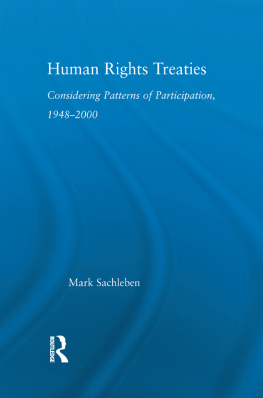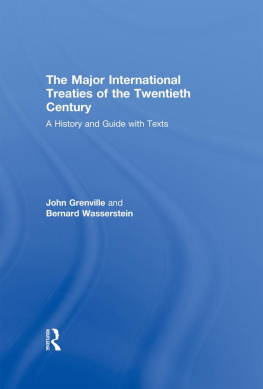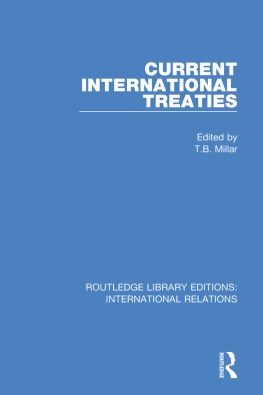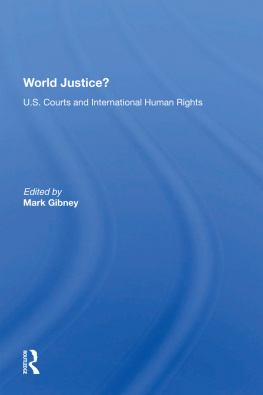Mark Sachleben - Human Rights Treaties: Considering Patterns of Participation, 1948-2000
Here you can read online Mark Sachleben - Human Rights Treaties: Considering Patterns of Participation, 1948-2000 full text of the book (entire story) in english for free. Download pdf and epub, get meaning, cover and reviews about this ebook. year: 2005, publisher: Routledge, genre: Politics. Description of the work, (preface) as well as reviews are available. Best literature library LitArk.com created for fans of good reading and offers a wide selection of genres:
Romance novel
Science fiction
Adventure
Detective
Science
History
Home and family
Prose
Art
Politics
Computer
Non-fiction
Religion
Business
Children
Humor
Choose a favorite category and find really read worthwhile books. Enjoy immersion in the world of imagination, feel the emotions of the characters or learn something new for yourself, make an fascinating discovery.
- Book:Human Rights Treaties: Considering Patterns of Participation, 1948-2000
- Author:
- Publisher:Routledge
- Genre:
- Year:2005
- Rating:4 / 5
- Favourites:Add to favourites
- Your mark:
- 80
- 1
- 2
- 3
- 4
- 5
Human Rights Treaties: Considering Patterns of Participation, 1948-2000: summary, description and annotation
We offer to read an annotation, description, summary or preface (depends on what the author of the book "Human Rights Treaties: Considering Patterns of Participation, 1948-2000" wrote himself). If you haven't found the necessary information about the book — write in the comments, we will try to find it.
Mark Sachleben: author's other books
Who wrote Human Rights Treaties: Considering Patterns of Participation, 1948-2000? Find out the surname, the name of the author of the book and a list of all author's works by series.
Human Rights Treaties: Considering Patterns of Participation, 1948-2000 — read online for free the complete book (whole text) full work
Below is the text of the book, divided by pages. System saving the place of the last page read, allows you to conveniently read the book "Human Rights Treaties: Considering Patterns of Participation, 1948-2000" online for free, without having to search again every time where you left off. Put a bookmark, and you can go to the page where you finished reading at any time.
Font size:
Interval:
Bookmark:
INTERNATIONAL RELATIONS
Charles MacDonald
Florida International University
The Politics of Gender in the European Union
Chrystalla A. Ellina
A Constructivist Approach Ycel Bozdaliolu
The United States and Regional Cooperation in Asia and Europe
Galia Press-Barnathan
A Sociological Perspective on Human Rights Abuse
Mayra Gmez
The Construction of an International Region
E. C. H. Keskitalo
A Study in Integrative and Distributive Bargaining
Eugnia da Conceio-Heldt
Globalization, Knowledge Transfers and Postcolonial Dilemmas
Vanessa C. M. Chio
Factors Influencing Cooperation
Denise K. DeGarmo
Constructing a Theory to Combat Corruption
Michael W. Collier
The Emergence of an International Norm
Arturo Santa-Cruz
Considering Patterns of Participation, 19482000
Mark Sachleben

2 Park Square, Milton Park, Abingdon, Oxon OX14 4RN
711 Third Avenue, New York, NY 10017, USA
p. cm. -- (New approaches in sociology)
Includes bibliographical references and index.
ISBN 978-0-415-97446-2
| HV99.C39S55 2006 361.70977311--dc22 | 2005022787 |
Introduction
Motivations for Participating in Human Rights Treaties
The Provisions of the Human Rights Treaties
Quantitative Variables and Human Rights Treaties
The Role of Reservations in Human Rights Treaties
Theoretical Bases for Human Rights Treaties
Conclusion
A Summary of Reservations Made to Each Treaty
A List of All UN Members and the Number of Human Rights Treaties They Participated in as of December 31, 2000
Font size:
Interval:
Bookmark:
Similar books «Human Rights Treaties: Considering Patterns of Participation, 1948-2000»
Look at similar books to Human Rights Treaties: Considering Patterns of Participation, 1948-2000. We have selected literature similar in name and meaning in the hope of providing readers with more options to find new, interesting, not yet read works.
Discussion, reviews of the book Human Rights Treaties: Considering Patterns of Participation, 1948-2000 and just readers' own opinions. Leave your comments, write what you think about the work, its meaning or the main characters. Specify what exactly you liked and what you didn't like, and why you think so.








![Deloria Jr. - Behind the trail of broken treaties an Indian declaration of independence. [The goundbreaking work by the preeminent spokesperson for American Indian rights]](/uploads/posts/book/171989/thumbs/deloria-jr-behind-the-trail-of-broken-treaties.jpg)